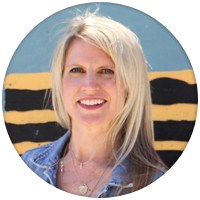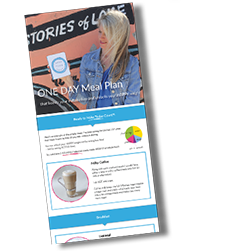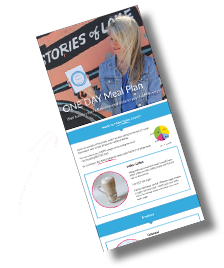
- Is recovery possible? YES and here’s the 1st thing to do
- 20+ years ago I recovered from my eating disorder
- Get the facts faster than I did
Is recovery possible?
Even when I was at my lowest point, I believed I could get better.
…But I had no idea how to do it.
Fortunately I was able to patchwork together a recovery plan.
And now I’ve been healthy for the last 20+ years.
I want people to know recovery is possible
Just before Canada’s National Eating Disorder Week approached, I had the chance to write for my alma mater’s student paper.
Sharing my story in The Queen’s Journal is a HUGE deal to me.
(That’s what I told the editor as soon as they accepted my Op-Ed.)
When I was 14 years old my yo-yo dieting quickly became a vicious cycle of starving, bingeing and purging. And this confusing behavior continued for years. I would have “died” if ANYBODY found out I had a complicated relationship with food.
But now that I understand how disordered eating develops and also how to get healthy, I’m driven to share my story.
I want people to get the facts faster than I did. And to know the very first step to take before they finish my article.

I wasn’t alone, wondering “Is recovery possible”?
These statistics are shocking:
One in four teenage girls spend 20 to 90 per cent of their waking time worrying about food, weight, and hunger. And for Canadian university-age people, between 10 and 20 per cent of females and four to 10 per cent of males suffer from a full-blown eating disorder. Sadly, these rates are on the rise.
Eating disorders have the highest mortality rate of any mental illness… I suspect largely because of the unnecessary shame and stigma that keep people who need help, silent.
This obstacle can be removed when we TALK, TALK, TALK as much as possible about eating disorders and recovery.
Why is recovery possible?
A big message I share in my story is that:
BIG PROBLEMS DON’T NEED BIG SOLUTIONS
But in order to get this information, you need to ask for help.
Ask for help!
Getting insight from someone outside your situation gives you a perspective you just can’t get on your own.
My recovery began when I walked down to Queen’s Student Wellness Services, back in 1994, and told a doctor what my typical day was like.
Recovery is possible and so much more!
When I first got healthy I developed the Who Is NOBODY? Program to help young people discover their interests and use them to help others.
At the time I was a full-time teacher and I wanted my students to experience building their identity on their actions.
The Who Is NOBODY? logo (I first drew on the back of a diet coke box) demonstrates how connecting with others helps us learn and grow. This truth is symbolized by the overlapping colours in the logo that make new colours. 
After a few years I was ready to do my own Who Is NOBODY? Project!
So I started opening up about my eating disorder via my blog, book and sharing my story whenever I had the chance to talk about it.
Here’s what you need to know if you’re wondering is recovery possible?
A few years ago I wrote about the lengths I went to exercise during an ice storm; a sign of obsessive behaviour. It was published in Queen’s Alumni Magazine.
And now it’s a fantastic full-circle feeling to be able to tell more of my recovery story to the Queen’s student community with the hopes it can help others take the same life-saving steps I did.
Having the chance to share what I learned makes the 10 years I struggled, worth it.
Here’s what I wish I knew when I had an eating disorder at Queen’s University:
Is recovery possible? Yes. And you can save time by asking for help.
Say GOOD BYE to disordered eating by asking for help.
Do you know someone who’s complicated relationship with food is disrupting their everyday life? Someone who may be asking themselves: Is recovery possible?
If you do, please share my story either by sending a link or sharing it in social media such as Facebook.
Here’s more info and resources about how to support someone you care about.


 These kinds of meals and snacks unlocked my HAPPY weight 21+ years ago (I lost 30 pounds without dieting!)
These kinds of meals and snacks unlocked my HAPPY weight 21+ years ago (I lost 30 pounds without dieting!)
You'll also be subscribed to my newsletter. Don’t like it? Unsubscribe in one click

 These kinds of meals and snacks unlocked my HAPPY weight 21+ years ago (I lost 30 pounds without dieting!)
These kinds of meals and snacks unlocked my HAPPY weight 21+ years ago (I lost 30 pounds without dieting!)
You'll also be subscribed to my newsletter. Don’t like it? Unsubscribe in one click




Sharing what I learned makes the 10 years I STRUGGLED worth it






Congratulations, Kelly!
Thanks Kathy!
I appreciate your support so much,
xoxxoKelly